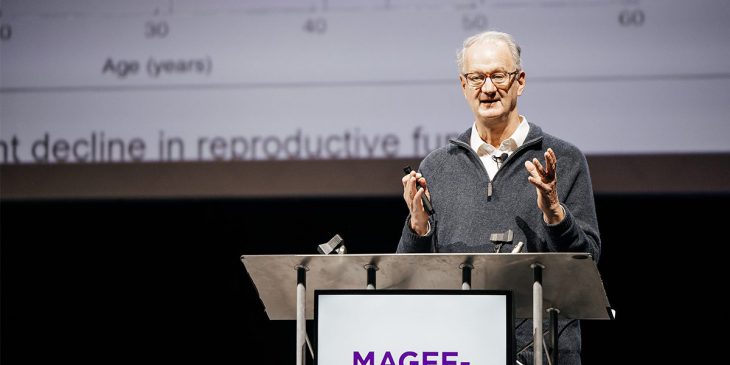On Feb. 21, 1875, a baby girl was born in a small city called Arles in the south of France. Jeanne Calment would go on to live 122 years and 164 days — the longest human lifespan on record. Calment, who once stated that she was “never, ever ill,” reached this milestone despite drinking, smoking cigarettes and eating dessert with every meal.
Her astonishingly long life underscores an important question for scientists: Could there be factors on the cellular level that contribute to longevity and resistance to age-related diseases, allowing some people to weather the storm of life better than others?
This, along with other questions surrounding the fundamental biology of aging, have intrigued Dr. Toren Finkel, professor of medicine at the University of Pittsburgh Division of Cardiology and director of the Aging Institute, for more than 20 years.
Finkel studies how a process called autophagy may promote longevity, a concept that he outlined in a recent talk at the 2021 Magee-Womens Summit, a three-day event where doctors and scientists discussed the latest research in women’s health and reproductive biology.
“Autophagy is like the cell’s housekeeping system,” said Finkel. “Autophagy wraps up dysfunctional proteins and other cellular trash and recycles or disposes of it.”
Autophagy may help explain research showing that animals that eat less tend to live longer. Food restriction can tamp down activity of mTOR, a protein that regulates metabolism in humans and mice and inhibits autophagy.
Finkel and his team found that mice bred to produce 25% of normal mTOR levels lived 20% longer — the human equivalent of about 15 years —and fared better on cognition tests than regular mice. Finkel believes this could be related to an increase in autophagy in these mice.
This finding suggests that stimulating autophagy in humans, which would sidestep mTOR’s inhibition of the autophagy process, could slow aging or even treat age-related diseases such as Alzheimer’s.
“One of the biggest questions about autophagy is whether individuals who are resistant to age-related diseases simply create less cellular waste or are actually better at cleaning up that waste with autophagy,” noted Finkel. “If it’s the case that these individuals are very good at autophagy, is there anything we can do about it in those who are not so good at it?”
According to Finkel, one potential target for stimulating autophagy is a protein called TFEB. TFEB helps regulate the production of several hundred other proteins, many of which are part of the autophagy housekeeping crew. In a phase I clinical trial, Finkel and his colleagues are investigating if a TFEB-regulating drug called GT300 could boost autophagy in healthy participants.
Although we don’t yet understand all the factors behind Jeanne Calment’s extraordinary lifespan, Finkel’s research holds promise for treating age-related diseases, which is certainly a cause for celebration — and maybe some dessert.
Haylee Baxendell is a Ph.D. candidate in the University of Pittsburgh School of Medicine’s Program in Microbiology and Immunology. She is participating in the UPMC Science Writing Mentorship Program.









